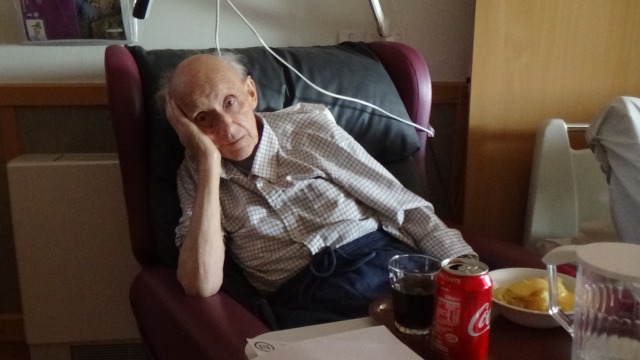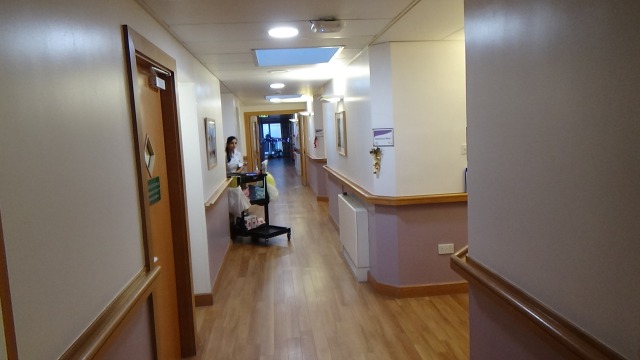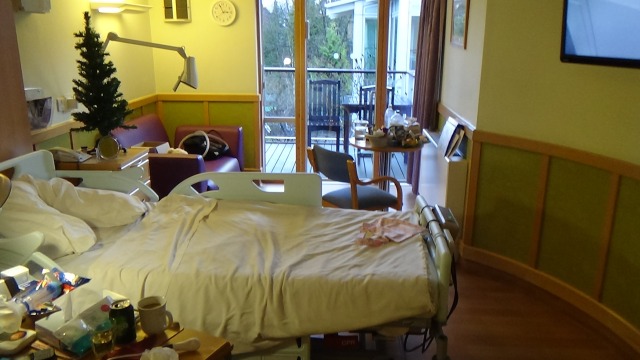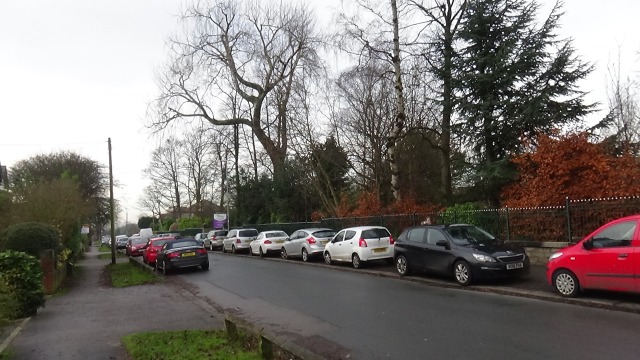
I first found out about St Gemma’s Hospice when I got an e-mail from Clare, whose actual job title was the ‘Head of Transformation’. She’d heard about me going door-to-door, writing poems for residents, and she wondered if I’d be up for getting involved in a different opportunity. St Gemma’s, she explained, is a charity that offers palliative and end of life care, for free, to the people of Leeds. Would I be interested in writing some poems for the patients?
It definitely felt like a different opportunity. One of the rules I’ve set myself on this journey is that I have to visit people in their homes. Admittedly, a hospice is only a temporary home. But it struck me that, for some of the patients here, it might be the last place they would ever stay.
As well as this, I thought about how I only ever ask one question as a Door-to-Door Poet: ‘What is important to you?’ I couldn’t help but wonder how visiting people in this particular situation might influence their response. When you’re reaching the end of your life, does it change what’s important to you?
So, a few months ago, me and Heather, the chief nurse, decided I should visit 3 patients on Monday the 9th of November. I’d then go home and write a poem each day, delivering them on the Friday. Soon after, it became apparent this would also be the week of the general election, with the result being announced on the Friday itself.
As I woke up on Monday, it felt like whatever happened next was going to be eventful. It was an icy morning at Newcastle station when I jumped on a train, destined for the bright lights of Leeds.
–
Captain’s Log 09/11/19 12:07

I’m standing outside St Gemma’s, just off Harrogate Road. It’s an oblong, yellow brick building, with stained glass windows; on the front is a huge statue of Jesus, which looks as if it’s floating in mid-air.
As I pass through the gate, I feel very out of my comfort zone. I have never done anything like this. I’m worried I’m going to say or do something that upsets someone. In the car park, I notice two visitors on their way out. I hide my camera, concerned that the act of holding one could seem disrespectful.

I walk through some sliding doors into a reception. The receptionist calls for Heather, who comes down and greets me, shaking my hand and thanking me for coming. Soon after, we’re joined by Amanda, who’s the head of patient care.

Amanda suggests that I wait on one of the wards while she asks a few patients if they’re up for getting involved. If she gets the thumbs up, she’ll come back and fetch me. I tell her this sounds good.
“Should we head over?” she asks.

Amanda leads me up a staircase and onto the Moors Ward, a long hallway with shiny laminate floors, cream walls and pine skirting boards. There’s the faint beeping of machines in the distance, the smell of disinfectant.
Along the hall are various doors, leading to private rooms for the patients. Amanda takes my coat and asks me to roll up my sleeves and put some hand wash on. She heads into a patient’s room while I wait outside. I watch as doctors and nurses walk back and forwards in their scrubs, talking in a medical jargon I can’t possibly understand.
After a few minutes, Amanda comes out and tells me it’s a yes. She leads me through the door. A man in his 80s is sitting in a purple armchair, wearing a checked shirt and jogging pants. To the right of him is a hospital bed.
“This is Lewis,” Amanda tells me.

She fetches me a chair and tells me to come and find her when we’re done. I take a seat and decide to start the way I always do, with my introductory poem.*
“I used to read a lot of poetry as a child,” Lewis says, in a soft Yorkshire accent. “I like Wordsworth’s ‘On Westminster Bridge’, I used to be able to recite that by heart.”
I ask him what’s important to him and he starts to tell me about the reason he’s here.
“I had a good idea what it was,” he says. “I should have seen the doctor sooner. When I did, he told me I had prostate cancer and cancer in one of my kidneys too, so they had to take it out. Luckily, my daughter was home at the time. She phoned the hospital and saved my life.”
“I worry about what’s going to happen to my wife,” he tells me. “But my son’s said he’ll take her to live with him in Cumbria. He’s got a beautiful garden. There’s squirrels, my wife sits and watches them for hours.”

Lewis tells me that, when it comes to the afterlife, he’s not all that concerned.
“I’m an atheist. When you die, you die. I accept it. When I was about 12, me and my pal went into a spiritualist church, y’know, where they contact the dead. It was tuppence to go in, so we paid and sat in the back. The spiritualist came on and said, ‘I’m getting a big “W”.’ This woman put her hand up and said, ‘It’s my husband, Walter, he’s recently passed.’ The spiritualist says, ‘Walter is telling me that he likes the new fireplace…’”
“Well, pretty soon, we both start laughing. And this feller came to throw us out. He said, ‘What are you laughing at?!’ I said, ‘It doesn’t make any sense, this person is supposed to be in heaven. They say it’s perfect, you’ve got everything you could ever want, and all Walter can talk about is a new bloody fireplace.’”
A nurse comes in with some homemade soup and a can of pop. I decide to let Lewis enjoy his meal in peace. I thank him for his time and arrange to come back on the Friday. I head out the door and back over to the reception.

The receptionist rings for Amanda, who comes to get me. She’s found another two people who are up for getting involved. The first is called Murray and he’s on the Dales Ward on the ground floor.
Amanda takes me down the stairs and into Murray’s room. He’s lying on a hospital bed in blue pyjamas and greets me with a really warm smile. Stood next to him is his wife, Doreen. I say hello to them both.

“You’re a poet?” Murray says, “Do you know it?” We laugh. “Spike Milligan was a good poet.” I really like Spike Milligan. We get talking about how he was such an all round entertainer- actor, comedian, musician.
“I used to like the variety shows,” Murray tells me. “At Leeds City Varieties.”
“We all went,” Doreen adds. “Everybody was dressed up in the old-fashioned clothes. They had acrobats and comedians, all sorts.” Murray tells me a bit more about what it was like.
“Everyone would join in the songs. The audiences were very critical too, they used to boo if they didn’t like it. Not like now, they clap at everything.”
“You could go down there,” Doreen suggests. “It’s still a theatre, maybe someone could show you around?” I think this is a great idea. I decide to get in touch with Leeds City Varieties and see if it can be done. I make plans to drop off the poem and wave goodbye to them both.

On my way out, I find Amanda and tell her I’m ready to speak to the last person. She leads me further down the hallway and into another room. A lady in her 60s is sat in an armchair by the door, with short hair and bright blue eyes; she’s hooked up to a drip and has a respirator over her face. She’s breathing quite heavily- it’s clear that she finds talking a bit more difficult than usual.
“Rowan, this is Sharon,” Amanda tells me. “When I told her about what you were doing, her eyes lit up.” She kneels down and looks at Sharon. “Take your time, OK?” She fetches me a chair and leaves us to it.

Sharon asks me something, but I can’t quite make out what it is. I lean closer.
“Do you think you miss people after you die?” she says, between deep breaths. I tell her I’m not really sure. “I asked a reverend when he came the other day, he wasn’t sure either. On the 11th of November, the doctor said I was dying, that it was going to be today. My sister told him to sod off,” she smiles.
She tells me a bit more about her family. Her sister is her twin, she’s called Jeannie. She’s also got two twin brothers, Malcolm and Michael, and an eldest called Tony- although Tony’s real name is actually Marseille.
“But we’ve always just called him Tony,” she explains.
“Jeannie comes to see me every day after work. It takes 2 hours if the traffic’s bad. She’ll sit and have her tea with me, wash me, then she goes home. Sometimes she doesn’t get in till 8 at night.”

I ask Sharon if she’s been thinking more about family since she came here.
“Yes,” she says, her eyes welling up. “I’ve seen a lot of them recently. We drifted apart a bit, after my Mam died. You think you’ve got all the time in the world,” she sobs, “but you don’t.”
I’m feeling a mixture of emotions at this point. I feel really sorry for Sharon, for what she’s having to go through. And I’m feeling like I don’t want to say anything that’s going to make her more upset.
As well as this, I feel guilty. I haven’t seen a lot of my relatives this year. I’ve spent so much time on trains, in B&B’s. Everything Sharon’s saying rings so true. I tell her I’m looking forward to seeing my family over Christmas.
“Don’t put it off,” she says. “Take it from me, some of us leave it till it’s too late. Get in touch with your family and do it now.” It’s a sobering warning.
I suggest a poem about the importance of keeping in touch.
“Could you do me a favour,” she asks, quietly. I nod, leaning in closer. “Could you write it for my sister?” I tell her I’ll give it a go. I make plans to come back, then leave Sharon to get some rest.

On my way out, I stop at Amanda’s office to get my coat. I must look a bit shook up because she asks me if I want to sit down for a minute. I tell her about the conversation, that I think the nurses here are doing a really good job.
“Well, we don’t do it for the money,” she jokes. “And any money we have in our house just goes on holidays with the kids. There’s no point in having it stashed away, you just don’t know what the future holds.”

As I walk towards the bus stop, everything feels loaded with meaning. Leaves are falling on the ground, children are running past on their way home from school.
It’s been a really moving experience. Understandably, a lot of the conversations have been about death. But I’ve also found a lot of life here too- in Lewis’ lively scepticism, in the happy memories Murray and Doreen share, and in the love and care Sharon’s family have shown to her while she’s been here.
As I get on the bus home, I think about how different this has been to any other trip. Usually, I come asking what’s important to other people. For the first time, I’ve had to ask what’s important to myself as well.
–
* I’m a Door-to-Door Poet
and I know that sounds quite crazy,
but this could be worse though,
I could be the Avon lady.
In school they taught me poetry’s bust,
wrote by toffs who’ve turned to dust
on country manors, deathly shrouds,
serious lords and fluffy clouds.
I found it quite hard to relate,
I grew up on a rough estate-
walls thin as paper used to trace,
the clouds an endless tone of grey.
I’m here to make poetry exciting,
like bungee jumping, but less frightening,
and I’m standing here to find
the subjects that flow through your mind.
Tell me about your life.
OK, maybe not the whole of it.
I’ll stick it in a poem
or at least have a decent go at it.
Maybe you heard a great story
you’d love to hear in rhyme.
Maybe your blood is boiling
from a recent council fine.
Maybe you dropped your smart phone
and it fell down the toilet,
I don’t know, I can’t decide for you
‘cos that would spoil it.
So cheers for listening to these verses,
I hope I got across my purpose,
don’t slam the door, don’t be nervous,
the Door-to-Door Poet is at your service.
–
Rowan McCabe


and then?
LikeLike
The poems and delivery? They’ll be in the next blog post, it’ll be up in a few weeks. I tend to split up the story when I do this, otherwise it’d be about 4,000 words. If you hit follow at the top of the website you’ll get an e-mail when it’s published 🙂
LikeLike
Here’s the return trip with the poems Amina: https://doortodoorpoetry.com/2020/01/28/st-gemmas-delivery/
LikeLike
In 1985 I took an 8 week hospital course to be a volunteer visiting cancer patients in their homes. In those days, hospice care was still a new concept. After being assigned to a couple of patients and learning so much from them, the AIDS epidemic suddenly hit my city hard. A newspaper story about one man’s bad experience led to my getting very involved, and staying involved until 1994. The early training for hospice taught that people who get involved in that kind of support are typically “poets, artists, saints and clowns.”
LikeLiked by 1 person
No way, that’s really interesting that poets were common. I had no idea.
LikeLiked by 1 person
Pingback: St Gemma’s Delivery – Door-to-Door Poetry